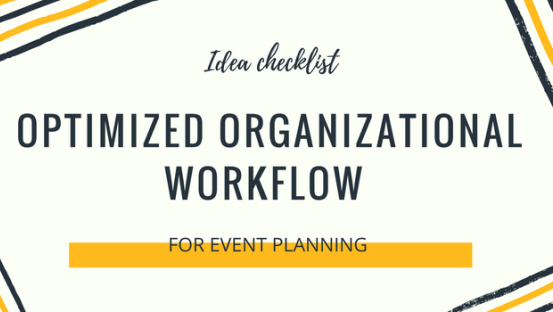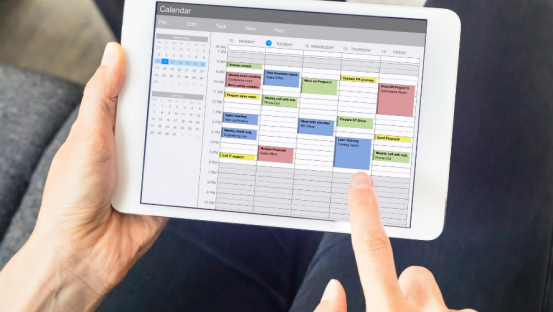Picking the right moderator for your panel discussion

You’ve decided to add a panel discussion to your upcoming event. You know it is going to be the perfect way to showcase a lot of ideas that are relevant to your event topic, and your audience will love hearing from a variety of experts. The next step is to choose your moderator.
The moderator will play a key role in the success of your panel discussion, so picking the right person will have a huge impact on the outcome. Here are some ideas on how to choose the right moderator.
What, exactly, is the role of a panel moderator?
Though the entire point of a panel discussion involves the free flow of ideas, this can quickly get completely off track and out of control if not kept in check. The moderator is there to make sure the panelists, and more importantly their ideas, connect with the audience.
Based on the event’s goals and direction, the panel moderator really needs to bring the panel discussion to life. This includes choosing the right panelists, and then preparing them for the discussion, as well as choosing the best format to make sure the panel discussion hits the goals of the event.
A moderator has a very different from the role from a panelist. They are not the star of the panel, but rather a facilitator who keeps a lively and informative conversation focused and flowing. The moderator should not dominate the conversation, but bring out the best in each of the panelists, so that all the ideas and viewpoints are showcased effectively.
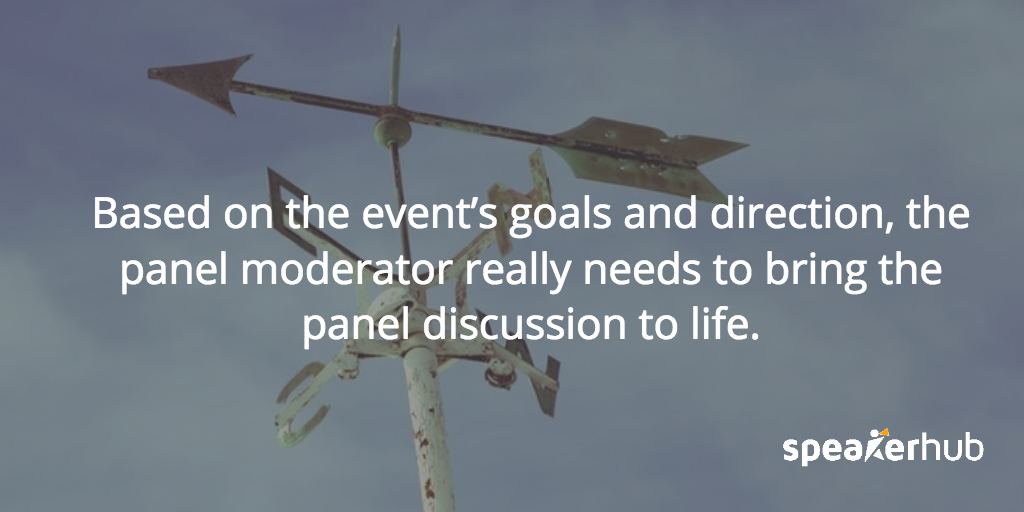
Experience and personality
Although on the onset, just choosing an industry guru might seem like the best course of action, being a moderator is more than just knowing one side of the topic extremely well: they need to have the right kind of personality coupled with a wealth of knowledge on all sides of the issue at hand.
The moderator needs to be an outgoing, inquisitive and social person, who knows exactly how to bring out the best in others. Moderators who are boring and flat will most likely host boring and flat panel discussions. They need to have a touch of modesty, realizing they are there to guide the conversation - not to be the star of the show.
Rory Vaden (an award winning public speaker and expert on panel discussions) says it perfectly in this quote:
“You have to spontaneously navigate an infinite number of dynamics that are perpetually changing at any given moment. It’s difficult to weave together points, create value for the audience and shine an uplifting spotlight on panelists, all the while keeping it entertaining!”
This being said, personality is not everything. You also need someone who knows the intricacies of the topic. They understand the various sides and viewpoints of the topic, how to choose the right balance of panelists, and how to be objective.
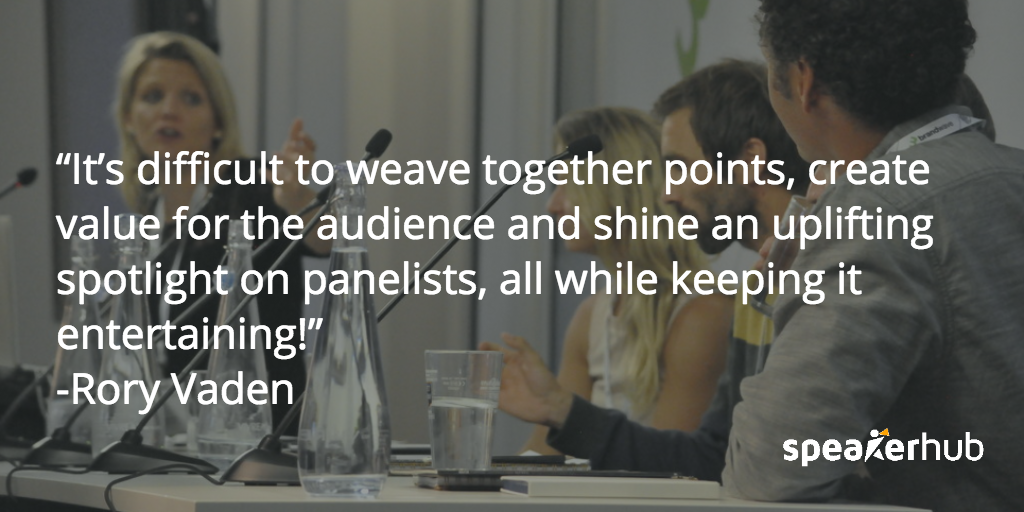
What kind of skills should you search for?
Balance: being an effective moderator is a balancing act. They must be able to track who has been talking a lot, and who hasn’t been talking enough. Giving each panelist enough airtime takes a lot of awareness and objectivity. There is also a fine line between a moderator who talks too much and one who talks too little. Some moderators can end up stealing the show, contributing just as much (or more) than the panelists, often without even noticing it. Whereas other moderators zip right up, and let the panelist take control of the discussion. Neither of these situations are ideal. A moderator needs to balance out the amount of talking between the panelists, as well as know when to add to the discussion and when to hold back.
Pace Management: the discussions need to feel like they easily flow from one topic to the next, without feeling awkward or forced. To do this, moderators need an exceptional sense of pacing. This includes knowing when to ask the next questions, or get an alternative view, when to move to the next topic or when to draw on the audience for interaction. A riveting panel discussion doesn’t flap like a sail in the wind, but rather has a direct course, the moderator needs to be able to direct the discussion in a timely and natural fashion.
Inquisitive: there is a reason that journalists, consultants, and analysts, make good moderators: they are great at asking questions and getting to the bottom of the responses. Being able to pose a general question is only one aspect, but being able to dig into what is being said and then make sense of the response will take the discussion to the next level.
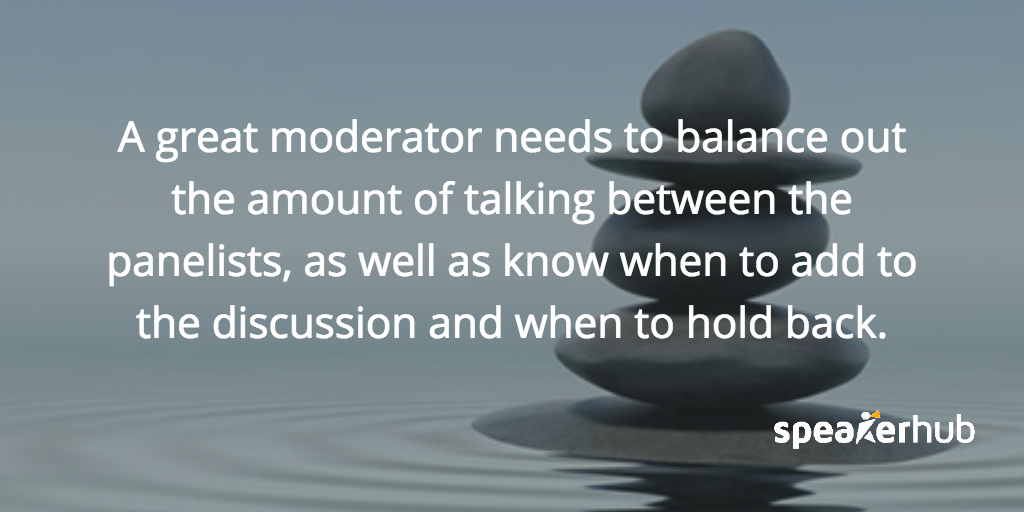
Now you know what you are looking for, here is how to choose:
-
Make a list of potential moderators.
The easiest way to do this is to use the SpeakerHub search function. You can find all of our moderators here. You can easily narrow down this search by selecting the topics on the right hand side. Once you have a list of potential moderators, it’s time to dig a bit deeper. -
What to look for in their profiles:
- Do they the experience you are looking for?
- Are they in the location you need, or can manage?
- What does their bio say: do they seem engaging and interesting?
-
Check the facts:
- Watch their videos. How interactive are they? Is the tone conversational? Is this person going to be effective with your audience?
- Read their testimonials and see if you can catch them in action.
- Review their professional website. Imagine that you are one of the panelists or someone in the audience: does their online presence give off the right impression?
-
Have a talk with them, and look for the following aspects:
- Do they ask you good, open-ended questions about the event? Do they ask about the audience and the objectives? Did you find them really easy to talk with, because they are personable and interesting? Are they naturally inquisitive? How they make you feel is very likely how they will make your panelist feel: so make note of it.
- When they are talking about their experience and knowledge in the field, do they know what they are talking about? If you get the sense that they are blagging, your audience will have the same feeling, so follow your intuition. If you don’t know enough about the field or topic, and you are unsure, ask someone who does to have a quick chat with them and get some external feedback.
- Find out how they prepare for a panel discussion. Do they sound like they will be thorough, or are they planning on sitting back on their heels and “seeing what happens”? Will they be proactive in making the panel discussion a success (this could mean picking the panelists, to coming up with a hashtag) or are they more interested in personal gains (ie. how much they will be paid, how long they will have to be at the event.) Are you excited and energized to start working with them, or do you feel a bit tired? These should be good indicators as to whether they will be the right panelist for your discussion.
-
Choose the right person. Out of the candidates you talked to, ask yourself:
- Who are you most excited about working with?
- Are they in line with the values of your event? For example, if you are going to be relying heavily on engaging the audience through social media, but they are a technophobe who thinks Twitter is a passing phase, maybe they are not the right fit.
- Who will add the most value to your event? Either based on their innovative and insightful ideas, or based on their expertise (or a combination of factors), who is going to help your event the most?

SpeakerHub makes finding the right moderator for your upcoming panel easier, by showcasing the right people with the right skills. Find out more about our moderators here.
We would love your feedback on this article. What have been the major pitfalls and successes? Share your ideas with us here.


